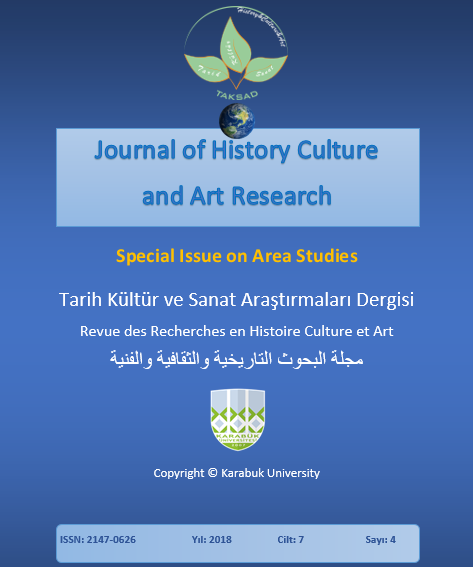Ethnic Self-Consciousness and Interethnic Relations in the Poly-Ethnic Region: A Research in Tatarstan
DOI:
https://doi.org/10.7596/taksad.v7i4.1855Keywords:
Ethnos, Nation, Poly-ethnic environment, International relations, Ethnic self-conscience.Abstract
The article investigates the state and dynamics of the national development and international relations in the course of 28 years in Tatarstan. It touches upon different and sometimes contradictory points of view on these processes. The article also represents the dynamics of the changes in the evaluation of these matters. Besides it studies the dynamics of opinions on issues related to the status of Tatarstan, the use of Tatar and Russian languages, etc.
Methods of a longitudinal research allow making a comparative analysis of the empirical data that have been accumulating for several decades since 1989. The last empirical survey was conducted by us in 2017. This survey of Naberezhnye Chelny residents aged over 18 was carried out according to a stratified (regionalized) sample (n = 650), and ensured representativeness.
References
Akhmetova, S. A. (2013). “Tatar-Russian Bilingualism within the Framework of the Reginal Context”, Scientific notes of Kazan University. Series: Humanities, vol. 155, No. 6, рр. 7-14.
Davis, H. & Veinguer, A. (2007). ‘’Building a Tatar Elite: Language and National Schooling in Kazan’’, Ethnicities, Vol. 7, No. 2, рp. 186–207.
Davis, H.; Hammond, P. & Nizamova, L. (2000). ‘’Media, Language Policy and Cultural Change in Tatarstan: Historic vs. Pragmatic Claims to Nationhood’’, Nations and Nationalism, Vol. 6, No. 2, рp. 203-226.
Fishman, J. A. (1979). ‘’The Sociology of Language’’, Language and Social Context: Selected Readings, P.P. Giglioli (Ed.), Harmondsworth: Penguin, рр. 45–58.
Fishman, J. A. (ed.) (1999). ‘’Handbook of Language and Ethnic Identity, Oxford University Press’’, New York.
Gayfutdinov A. A. (2014). Rol’ zemskikh uchrezhdeniy v razvitii narodnogo obrazovaniya v kontze XIX – nachale XX vekov (na primere Chistopol’skogo uezda Kazanskoy gubernii) [Role of Territorial Establishments in Development of National Education in the End of XIX and the Beginning of the XX Centuries (on the example of the Chistopol district of the Kazan province). In: Baltic Humanitarian Journal. № 1, pp. 10–12.
Gorenburg, D. (2005). ‘’Tatar Language Policies in Comparative Perspective: Why Some Revivals Fail and Some Succeed’’, Ad Imperio, No. 1, рp. 1–27.
Graney, K. (1999). ‘’Education Reform in Tatarstan and Bashkortostan: Sovereignty Projects in Post-Soviet Russia’’, Europe-Asia Studies, Vol. 51, No. 4, рp. 611–632.
International language rights norms in the dispute over Latinisation reform in the Republic of Tatarstan (2010). Caucasian Review of International Affairs, Vol. 4, No. 1, рp. 43-56.
Musina, R. N. (2011). “National Languages within School Education System. Conclusion. Tatar Language”, Languages within the System of the Tatar Republic Education: The Results of Ethno-sociological Investigation, Kazan: Tatar Publishing House, pp. 16–28, 135–136.
Smolicz, J. J. (1979). ‘’Culture and Education in a Plural Society, Curriculum Development Centre’’, Canberra.
Wertheim, S. (2003). ‘’Language Ideologies and the “Purification” of Post-Soviet Tatar’’, Ab Imperio, No 1, рp. 347-69.
Zaytseva, O. Yu. & Mikhailova, I. V. (2016). Pedagogicheskoe modelirovanie formirovaniya polikul’turnoy kompetentnosti buduschego pedagoga [Pedagogical Modeling Multicultural Competence Formation of the Future Teacher]. In: Baltic Humanitarian Journal. V. 5. No. 1 (14), pp. 110–114.
Downloads
Published
How to Cite
Issue
Section
License
All papers licensed under Creative Commons 4.0 CC-BY.- Share — copy and redistribute the material in any medium or format
- Adapt — remix, transform, and build upon the material for any purpose, even commercially.
Under the following terms:
Attribution — You must give appropriate credit, provide a link to the license, and indicate if changes were made. You may do so in any reasonable manner, but not in any way that suggests the licensor endorses you or your use.
- No additional restrictions — You may not apply legal terms or technological measures that legally restrict others from doing anything the license permits.







